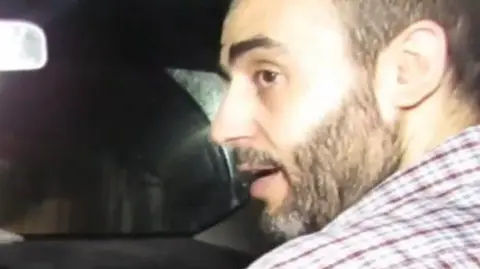Israel PM says Hamas's Gaza chief Mohammed Sinwar has been killed
 IDF
IDFIsrael's Prime Minister Benjamin Netanyahu says its military has "eliminated" Hamas's Gaza chief Mohammed Sinwar, one of its most wanted men and the brother of the group's late leader Yahya Sinwar.
Mohammed Sinwar was reportedly the target of a massive Israeli strike on the courtyard and surrounding area of the European hospital in the southern city of Khan Younis on 13 May, which the Israeli military said destroyed Hamas "underground infrastructure".
Gaza's Hamas-run Civil Defence agency said that 28 people were killed. Hamas itself has neither confirmed nor denied Sinwar's death.
Yahya Sinwar, mastermind of Hamas's 7 October 2023 attack on Israel, was killed by Israeli troops last October.
Israel launched a military campaign in Gaza in response the unprecedented cross-border attack 600 days ago, in which about 1,200 people were killed and 251 others were taken hostage.
At least 54,084 people have been killed in Gaza since then, according to the territory's Hamas-run health ministry.
Mohammed Sinwar, 49, joined Hamas shortly after it was founded in the late 1980s and become a member of the group's military wing, the Izzedine al-Qassam Brigades.
He rose through the ranks and by 2005 he was commander of the Khan Younis Brigade.
He was believed to have been one of the masterminds of a 2006 cross-border attack in which Israeli soldier Gilad Shalit was seized. Sgt Shalit was released after five years in captivity in exchange for more than 1,000 Palestinian prisoners in Israeli jails, including Yahya Sinwar.
Mohammed Sinwar was also reported to have been close to Hamas's late military chief Mohammed Deif and been involved in the planning of the 7 October 2023 attack.
Netanyahu announced that he was dead during a special debate in the Israeli parliament on Tuesday called by the opposition to address what it called "the government's complete failure to achieve the war's goals: the return of all the hostages and defeating Hamas".
In response to the criticism, the prime minister listed Israel's achievements.
"In 600 days of the 'War of Revival', we have indeed changed the face of the Middle East," he said. "We drove the terrorists out of our territory, entered the Gaza Strip with force, eliminated tens of thousands of terrorists, eliminated Mohammed Deif, [political leader Ismail] Haniyeh, Yahya Sinwar and Mohammed Sinwar."
Until now, Israeli officials have been cautious when speaking about Mohammed Sinwar's fate.
The Israeli military's statement about the 13 May air strike did not mention him, saying only that it targeted "Hamas terrorists who were operating in a command-and-control centre that was embedded in an underground terrorist infrastructure site underneath the European hospital". However, Israeli media reported at the time that he was the intended target.
Five days later, Israeli Defence Minister Israel Katz told parliament that, while there was no official confirmation, "all indications" from Israeli intelligence were that Sinwar was killed.
The European hospital has been out of service since the attack two weeks ago.
CCTV footage shows children, women and men walking around the hospital's courtyard just before it is engulfed by an explosion. As the smoke clears, a large crater begins to form.
Medics said they received no warning from Israeli authorities. The hospital was also not covered by any Israeli evacuation orders issued since the military resumed its offensive against Hamas on 18 March, following the collapse of a two-month ceasefire.
UN human rights chief Volker Türk said the killing of civilians was "as tragic as it is abhorrent", and that Israel was bound by international law to ensure to spare their lives even if it believed that destroying the underground structures offered a definite military advantage.
 Reuters
ReutersNetanyahu also addressed on Tuesday the issue of the 58 hostages still being held by Hamas.
"I am fully focused on the mission of bringing back all our hostages - both the living and the fallen," he said. "According to the information we currently have, there are 20 hostages who are confirmed to be alive. This is undisputed. In addition, there are up to 38 other hostages who are believed to be deceased."
Earlier this month, the prime minister said there was "uncertainty" about the condition of three of the 24 hostages previously believed to be alive in captivity.
Days later, one of the living hostages, Israeli-American Edan Alexander, was freed by Hamas in what the group said was a goodwill gesture to US President Donald Trump, who is attempting to broker a new ceasefire and hostage release deal.
Netanyahu also declared that Israel had made "a dramatic shift toward the complete defeat of Hamas" over the past two days by "taking control of food distribution in the Gaza Strip".
He was referring to the controversial new aid distribution system run by the US and Israeli-backed Gaza Humanitarian Foundation. The system uses US security contractors and bypasses the UN, which says it goes against fundamental humanitarian principles.
The Hostages and Missing Families Forum, which represents many hostages' families, welcomed the prime minister's announcement about Mohammed Sinwar but told him: "The time has come to achieve true national victory - one that includes bringing home all the hostages and beginning the restoration of Israeli society."
